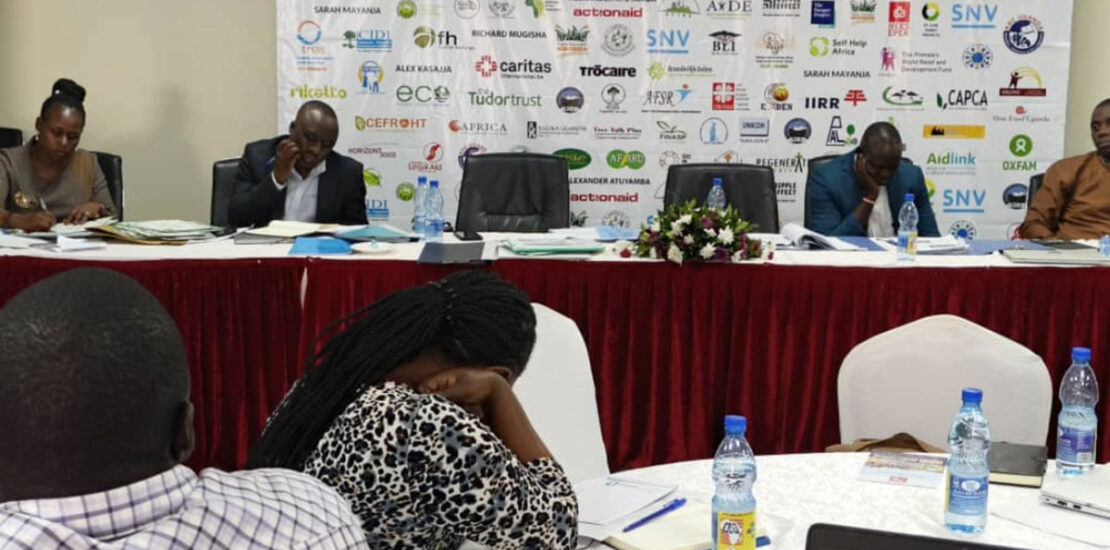Strengthening the Agroecology Movement Through Strategic Partnerships
- May 10, 2025
- Posted by: CEFROHT Reporter
- Category: Agroecology

As part of its continued commitment to advancing food sovereignty and sustainable agricultural transformation in Uganda and the broader East African region, the Centre for Food and Adequate Living Rights (CEFROHT) is actively strengthening its collaborative engagements with like-minded organisations to reinforce the agroecology movement.
One of the critical partnerships in this effort is with Participatory Ecological Land Use Management (PELUM) Uganda, a national network that brings together civil society organisations advancing ecological land use, agroecology, and sustainable food systems. As an active member of PELUM, CEFROHT participates in various strategic forums and working groups that help align efforts across the agroecology movement in Uganda.
Recently, CEFROHT participated in the Country Working Group (CWG) on Sustainable Food Systems and Ecological Land Use, which was convened on 29 April 2025 at Africana Hotel in Kampala. The CWG brought together key stakeholders, including NGOs, farmer organisations, policy actors, and academic institutions, to discuss and reflect on the state of food systems in Uganda and propose unified actions to address systemic challenges.
During this engagement, CEFROHT contributed its legal and policy expertise to highlight the importance of anchoring agroecology in law and governance frameworks. The discussions centred around the increasing corporatisation of agriculture and the risks it poses to farmer autonomy and biodiversity, the need to safeguard indigenous seed systems and local knowledge, and the gap in enforcement of existing laws and policies that promote ecological land use.
A key outcome of the CWG meeting was the adoption of a new and collective Action Plan, which aims to push for stronger, more resilient, and people-centred food systems in Uganda. Under this action plan, organisations within the CWG, including CEFROHT, committed to jointly advocate for the recognition of agroecology in Uganda’s national food and agriculture policies and push for increased budget allocations to support ecological farming initiatives at the local government level. The CWG also recognised the need to support and replicate agroecology learning centres as platforms for farmer-to-farmer knowledge sharing, experimentation, and grassroots movement building.
A deliberate effort will be made to ensure that youth and women are at the forefront of agroecology programming, benefiting from capacity-building, seed sovereignty initiatives, land access advocacy, and market linkages. CEFROHT committed to continue providing targeted legal empowerment to these groups to defend their land and food rights.
Within the CWG, CEFROHT plays a unique and strategic role in bridging agroecological practice with legal and policy reform. As a legal organisation, CEFROHT uses its capacity to review and analyse agricultural and environmental legislation, draft model legal frameworks for agroecology, conduct legal empowerment trainings for farmers and CSOs, facilitate dialogue between rights holders and duty bearers under Uganda’s Human Rights Enforcement Act (2019), and provide legal aid and strategic litigation support for communities facing violations of their agroecology-related rights.
CEFROHT also supports the documentation of best practices and community testimonies that provide evidence-based justification for investing in agroecology as a climate-resilient and socially just solution.
The agroecology movement cannot thrive in silos. It requires intentional, coordinated, and multi-stakeholder collaboration. By working through networks such as PELUM and participating in platforms like the Country Working Group, CEFROHT is reaffirming its belief that transforming food systems is a collective endeavour.
This strengthened partnership approach will continue to amplify the voices of farmers and community-based actors, influence national food system dialogues and legal reforms, mobilise knowledge and resources for agroecological transition, push back against industrial agriculture narratives and policies, and, most importantly, protect the right to food, land, seed, and dignity for all Ugandans.
Together, we can create an agroecology-powered future—one rooted in justice, sovereignty, biodiversity, and resilience.
